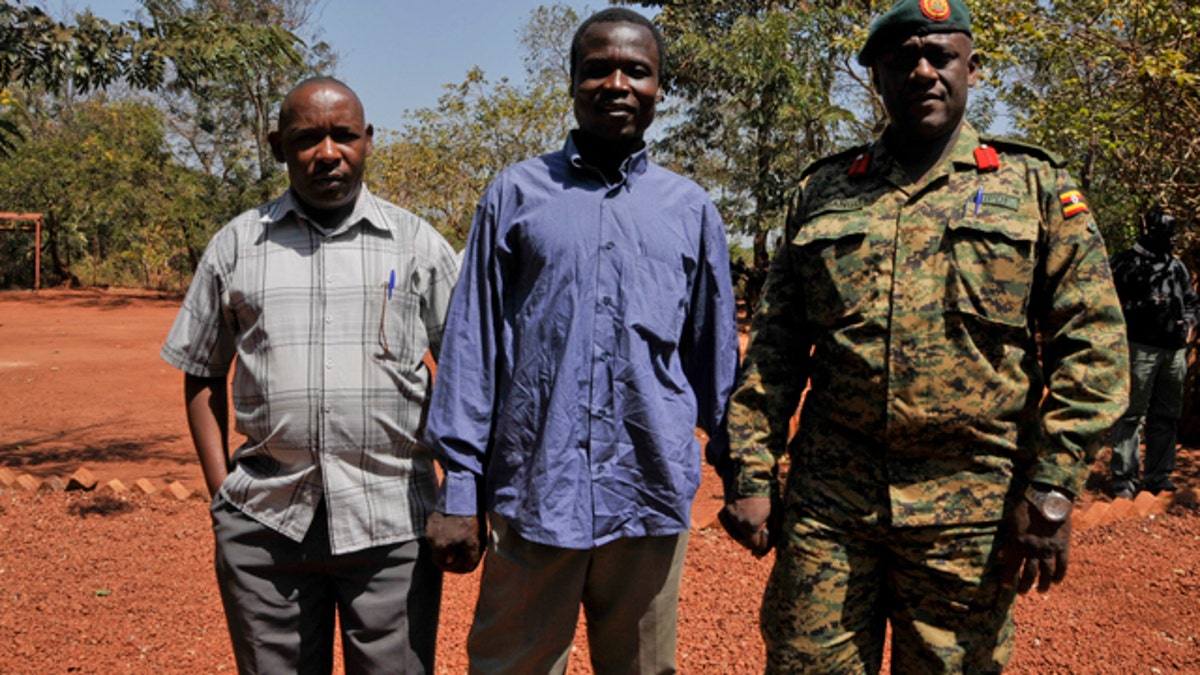
Jan. 16, 2015: A man said by the UPDF to be the wanted Lord's Resistance Army (LRA) commander Dominic Ongwen, center, stands with Ugandan Contingent Commander to the African Union Regional Task Force Col Michael Kabango, right, and another unidentified man, left, prior to being handed over by the UPDF to the African Union Regional Task Force who later handed him over to Central African Republic authorities in the Central African Republic. (AP Photo/Uganda People's Defence Force, Mugisha Richard)
THE HAGUE, Netherlands – Lord's Resistance Army commander Dominic Ongwen, who arrived Wednesday in The Hague to stand trial at the International Criminal Court, is remembered by his grandmother as a victim himself, having been kidnapped as a boy by the LRA and turned into a child soldier.
Ongwen's grandmother Anna Angeeyo, 80, told Uganda's Daily Monitor newspaper that she last saw him in 1990 as "an innocent and quiet" boy "who liked digging." Ongwen was abducted by the LRA as he came back from a primary school in northern Uganda, she said.
While in the custody of the Ugandan army last week, Ongwen was videotaped describing his experiences with the LRA and its top commander, Joseph Kony, a wanted war criminal. The video, shot by the Ugandan military, was obtained by The Associated Press.
"They found me a very sharp recruit," Ongwen said in his native Acholi language, describing how he was viewed by his first LRA commanders. "Every morning when they would blow the whistle for operation, they would find me in my position already standing."
Ongwen's story, as he tells it with some details corroborated by other interviews, provides a rare glimpse into the LRA, which for nearly 30 years has plagued central Africa with a campaign of murders, torture, kidnappings, the use of child soldiers and sex slaves.
Ongwen, who stands charged by the ICC with four counts of war crimes and three counts of crimes against humanity, says he went to South Sudan in 1994 for LRA military training and was promoted to platoon commander.
Ongwen became known as a fierce fighter whose attacks on civilians and Ugandan army positions made him a favorite with Kony, according to former LRA fighters.
"He was tenacious and courageous in operations he commanded," said ex-LRA soldier Joseph Okumu in a phone interview with AP. Okumu surrendered in 2011 in Central African Republic and has resettled in Uganda.
Ongwen was promoted by Kony to brigadier at 28, the youngest LRA officer to reach that rank, according to the Ugandan army. Ongwen commanded the Sinia Brigade, one of the four LRA units blamed for atrocities in northern Uganda, South Sudan, Congo and Central African Republic.
Ongwen's supervisor, Vincent Otti, pushed for negotiations with Ugandan government. The negotiations were unsuccessful and in 2007 an Kony ordered that Otti be executed for encouraging the talks. Ongwen was the only commander who pleaded with Kony to spare Otti's life, according to the LRA Crisis Tracker, a database and reporting system run by non-governmental groups Invisible Children and Resolve which record LRA attacks.
Ongwen's loyalty to his former mentor weakened his influence within the LRA but, according to Invisible Children, Kony spared Ongwen from the subsequent purge of Otti loyalists because of his ability to lead troops on daring missions. Soon after, Ongwen reportedly led a raid on a South Sudanese military garrison in June 2008 that killed 14 soldiers.
Ongwen was one of five LRA commanders indicted by the ICC in 2005. Three other commanders, Otti, Okot Odhiambo and Raska Lukwiya, have since died, according to the Ugandan army. Kony is the only one of the five to remain at large.
After the collapse of the negotiations with the Ugandan government, Kony assembled his fighters, who had been spread across Uganda and South Sudan, and crossed into Congo.
0n Dec. 12, 2008, the Ugandan army launched an attack on an LRA base in Garamba National Park in Congo, pushing the group into disarray.
"From that moment, I started hearing and reflecting on messages about amnesty ... I kept pondering over it. I slowly started giving up on rebel life," Ongwen said last week.
He said he met with Kony last December in the Darfur area of Sudan. He said he rejected Kony's plan to abduct people in Central African Republic and to meet with Nigeria's extremist Boko Haram rebels, South Sudan's rebel leader Riek Machar and the Seleka rebels of Central African Republic. Ongwen said Kony arrested him and had him beaten but then released him on Dec. 27.
"I left at night with no shoes and no personal belongings," said Ongwen. "I passed through the hands of several militia, then (Sudan's) Janjaweed militia which later handed me over to the Seleka rebels. A local chief then called U.S. forces who came and picked me up."
The U.S. soldiers handed him over to Ugandan troops in the Central African Republic. He arrived in The Hague on Wednesday in ICC custody.
"I have shown my true character by coming out (of the bush)," Ongwen said in the video, indicating he wanted amnesty. "I don't want to die in the wilderness."
Back in Uganda, his grandmother longs to see him.
"My wish is to meet him in person," she said. "But I'm not sure I would recognize him."








































